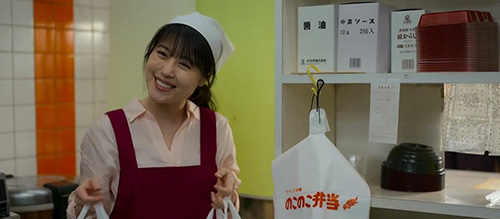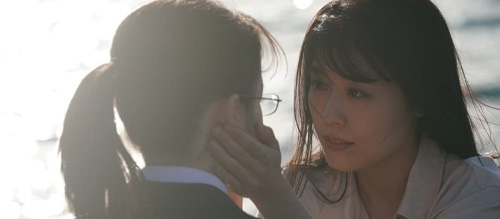Call Me Chihiro (2023) Review

Call Me Chihiro (2023)
Director: Rikiya Imaizumi
Screenwriters: Rikiya Imaizumi, Kaori Sawai
Starring: Kasumi Arimura, Lily Franky, Jun Fubuki, Hana Toyoshima, Tetta Shimada
The blurb of 2023 Japanese Netflix Original film Call Me Chihiro describes the titular Chihiro (Kasumi Arimura) as an unapologetic former sex worker. Unapologetic is possibly too strong of a term for the passive protagonist of prolific filmmaker Rikiya Imaizumi’s latest film. Based on the manga of the same name, by Hiyoyuki Yasuda, we follow Chihiro (Kasumi Arimura) as she leaves her old life behind and serves bento to a welcoming town of friendly faces.
While it’s true that Chihiro (Arimura) displays no shame or remorse for her life choices, in this sedentary seaside town she doesn’t need to, the stigma of sex work isn’t really present. There is an allusion to the hardship she has faced, but this is definitely a more sanitized portrayal of that world. It’s an interesting choice of past life for the main character, but it’s almost irrelevant; it’s as if Chihiro would be equally lost if she was an architect or a doctor. The very adult nature of her previous life does, however, provide a stark and interesting juxtaposition to her childish attitudes and playful way of seeing the world.
This childishness becomes quite grating but makes sense for a character somewhat stuck in arrested development. Her companions are teenaged Okaji (Hana Toyoshima) and school boy Makoto (Tetta Shimada), though she is notably not in a position of authority with these two. If anything, they are her peers.
Chihiro’s ex-employer, Utsumi (Lily Franky) describes her as missing something inside, and Kasumi Arimura’s acting has to be praised. She does a great job of portraying this lack of engagement with the wider world, wearing the same expression whether she’s apologising for some unauthorised babysitting, watching a bar fight, or burying a corpse.
The film is brilliant at showing rootlessness and transience. Chihiro’s loneliness is made evident as she crawls on all fours to get attention from a disinterested cat. Inhibitions don’t plague her, and the eagerness she displays for some attention is very telling.

One aspect that is interesting in the first quarter of the film is Okaji’s obsession with Chihiro, the voyeurism and photographs a potential metaphor for the ownership of sex workers. But as the film goes on, and the two become friends, this doesn’t amount to anything. It is simply never explained why this teenage girl has taken hundreds of photos of a nearly-thirty-year-old woman playing on the swings.
Alongside food, which is an obvious motif – the rice and vegetables nourishing the characters’ bodies whilst the conversations and interactions nourish their souls – the other main theme running throughout the story is the importance of found family. Unfortunately, parents don’t fare well in this world, all of them unable to offer their children what they need. Chihiro’s found family are a motley crew, as lost and lonely as she is. But her impact on their lives, whilst on the surface wholly inappropriate, is nothing but positive.
The theme of chosen family is not unique in film, it’s a concept that can be found everywhere from Hunt for the Wilderpeople to Toy Story or Ponyo. A notable example is Hirokazu Kore-eda’s wonderful Shoplifters, also starring Lily Franky. While the characters in Shoplifters are complex and well-rounded, Call Me Chihiro unfortunately falls short. The large ensemble cast drift into caricature at times.
Call Me Chihiro is an intimate and slow close-up on a life and the ripples left behind when it lands. The film explores some really interesting themes: the importance of found family, the notion of escape, labels, and of where happiness lies. It is very slow-paced, leaning heavily into the much-beloved indie trope of meandering. It is potentially 20-minutes too long. The ending falls slightly flat as the character Chihiro doesn’t seem to have developed much, instead choosing to fall back on old habits of avoidance and solitude. While it has much to offer, it does just lack the warmth and satisfaction one would expect from a film about the joy of people and company.
Score: 17/24

